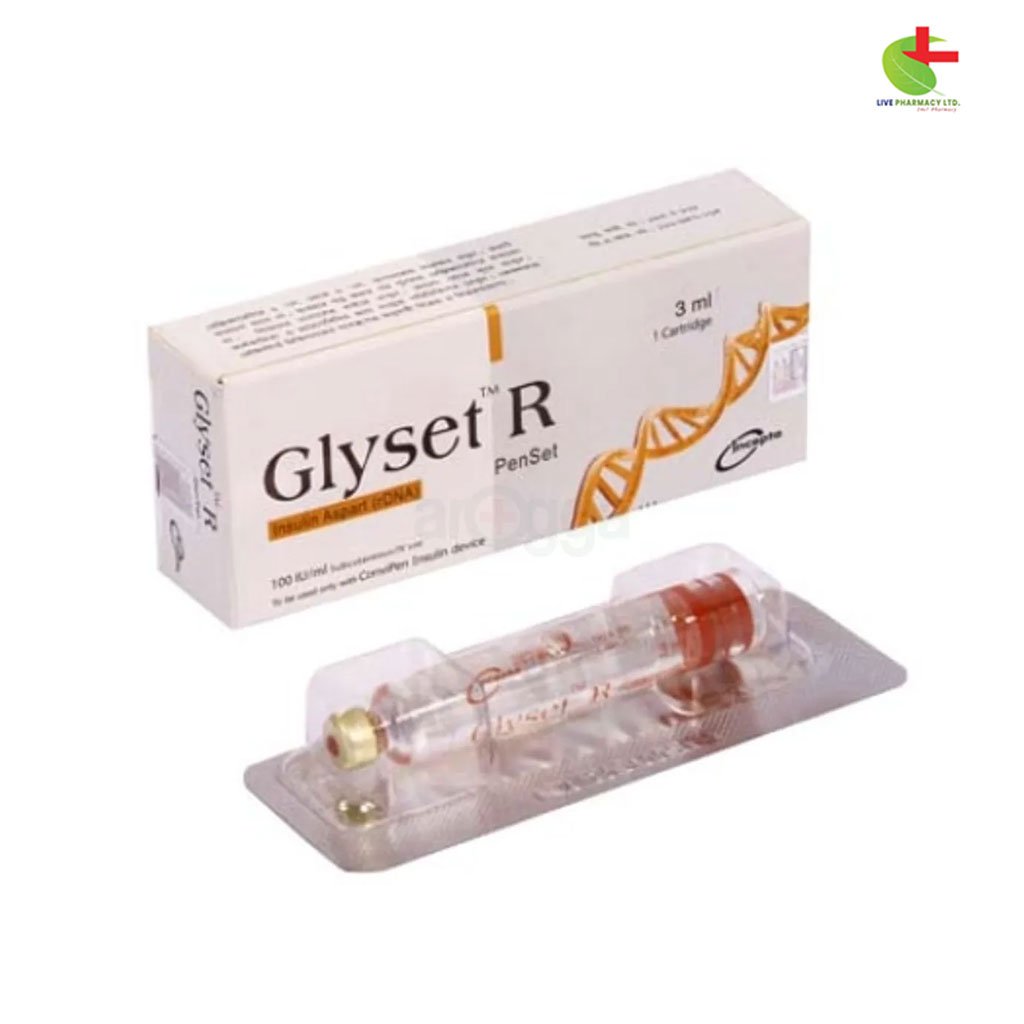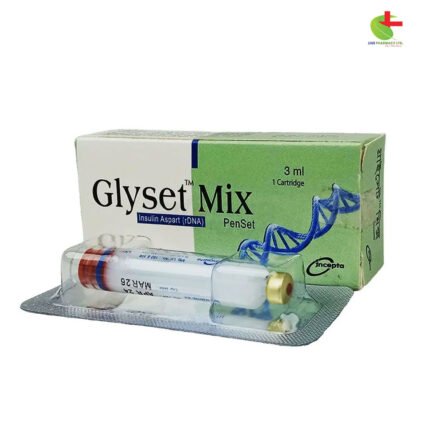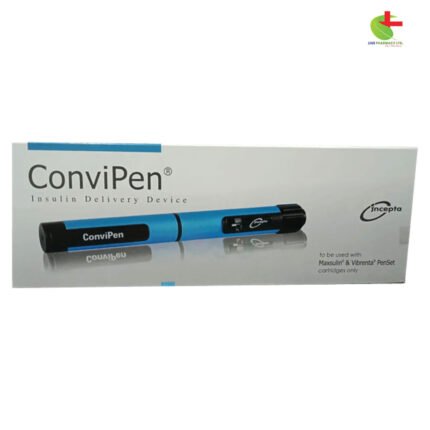Glyset R Penset
550.00৳ Injection
- Protamine Crystallised Glyset R is an insulin analog that effectively enhances glycemic control in patients with diabetes mellitus.
- Each milliliter contains 100 IU (3.50 mg) of Insulin Aspart, providing a rapid onset of action compared to regular human insulin.
- It regulates glucose metabolism by facilitating cellular uptake and inhibiting hepatic glucose output.
- Glyset R is suitable for subcutaneous or intravenous administration and should be used under medical supervision.
- Consult a healthcare professional before use for personalized dosage and treatment adjustments.
 Brand
Brand
|
Incepta Pharmaceuticals Ltd |
|---|---|
 Generics
Generics
|
Insulin Aspart [Protamine Crystallised] |
 Type
Type
|
SC Injection |
Indications
Protamine Crystallised Glyset R is an insulin analog designed to enhance glycemic control in individuals diagnosed with diabetes mellitus.
Always consult a registered healthcare professional before using this medication.
Composition
Each milliliter of the solution contains 100 IU (equivalent to 3.50 mg) of Insulin Aspart (rDNA).
Description
Glyset R (rDNA) is a sterile, clear solution formulated for subcutaneous or intravenous injection. This insulin analog serves as a glucose-lowering agent and has a quicker onset of action compared to standard soluble human insulin. Glyset R closely resembles regular human insulin, differing only by a single amino acid substitution, where Proline is replaced by Aspartic acid at position B28. It is produced using recombinant DNA technology.
Pharmacology
The main function of Insulin Aspart is to regulate glucose metabolism. It binds to insulin receptors on muscle and fat cells, facilitating glucose uptake and concurrently inhibiting glucose production in the liver.
Dosage
Insulin Aspart acts faster and has a shorter duration of action than traditional soluble human insulin. Therefore, it is typically administered just before a meal, although it can also be given soon after a meal when necessary.
Dosage for Insulin Aspart is personalized and should be determined based on a physician’s guidance, tailored to the patient’s specific needs. It is usually prescribed in conjunction with a long-acting insulin, which should be administered at least once daily.
The typical insulin requirement ranges from 0.5 to 1.0 IU/kg/day for adults and children over two years. In meal-related treatments, 50-70% of this requirement can be supplied by Insulin Aspart, while the remainder is met by long-acting insulin. Dosage adjustments may be necessary if the patient increases physical activity or alters their diet, as exercising right after meals may elevate the risk of hypoglycemia.
Administration Methods:
- Subcutaneous Injection: Insulin Aspart is injected subcutaneously in the abdominal area, buttocks, thigh, or upper arm. Due to its rapid action, it should be injected immediately (within 5-10 minutes) before a meal.
- Continuous Subcutaneous Insulin Infusion (CSII): Insulin Aspart can also be delivered through an external insulin pump. The initial pump settings should reflect the total daily insulin dose from the previous regimen, with approximately 50% administered as meal-related boluses and the rest as a basal infusion. It is crucial not to mix Insulin Aspart with any other insulin when using an infusion pump.
- Intravenous Use: For glycemic control, Insulin Aspart can be administered intravenously under medical supervision. Close monitoring of blood glucose and potassium levels is essential to prevent hypoglycemia and hypokalemia. For IV use, it should be diluted to concentrations between 0.05 IU/mL and 1.0 IU/mL in polypropylene infusion bags, and is stable in fluids like 0.9% sodium chloride. Always consult a registered healthcare professional before using this medication.
Instructions for Patients Before Injection:
- Follow the instructions provided with the ConviPen to correctly insert the cartridge and attach the needle.
- Gently invert the pen 8-10 times to ensure the insulin is well mixed.
- Remove the needle cap and expel any air bubbles from the cartridge.
- Adjust the dosage button to the prescribed dose and inject it into the designated area.
- To avoid cross-contamination, ensure the needle does not come into contact with any surfaces during preparation.
Always consult a registered healthcare professional before using this medication.
Interactions
Several medications can impact glucose metabolism and may necessitate dosage adjustments. The following substances may decrease the need for Glyset R: oral antidiabetic agents, angiotensin-converting enzyme (ACE) inhibitors, disopyramide, fibrates, fluoxetine, monoamine oxidase inhibitors, propoxyphene, pentoxifylline, salicylates, and sulfonamide antibiotics.
Conversely, the following substances may increase Glyset R requirements: thiazides, glucocorticoids, thyroid hormones, beta-sympathomimetics, growth hormone, and danazol. Additionally, beta-blockers, clonidine, lithium salts, and alcohol can either enhance or diminish insulin’s blood glucose-lowering effect.
Side Effects
Potential side effects of Glyset R include hypoglycemia, allergic reactions, injection site reactions, lipodystrophy, itching, and rashes.
Pregnancy & Lactation
Classified as pregnancy category B, Protamine Crystallised Insulin Aspart does not present restrictions during lactation. Insulin treatment in nursing mothers typically does not affect their infants, although dosage adjustments may be required.
Precautions & Warnings
It is essential to monitor blood glucose levels in all patients receiving insulin. Any adjustments to Glyset R treatment regimens should be done cautiously and under medical supervision.
Overdose Effects
Although a specific overdose threshold for insulin is not defined, excessive doses may lead to hypoglycemia in sequential stages. Mild episodes can be treated with oral glucose or sugary products. Severe episodes, where the patient loses consciousness, may require glucagon (0.5 to 1 mg) administered intramuscularly or subcutaneously, along with intravenous glucose if the patient does not respond to glucagon within 10 to 15 minutes. Upon regaining consciousness, it is advisable to provide the patient with oral carbohydrates to prevent relapse.
Therapeutic Class
Rapid Acting Insulin
Storage Conditions
Store between 2°C and 8°C in a refrigerator. Do not freeze. Protect from light.













Reviews
There are no reviews yet.